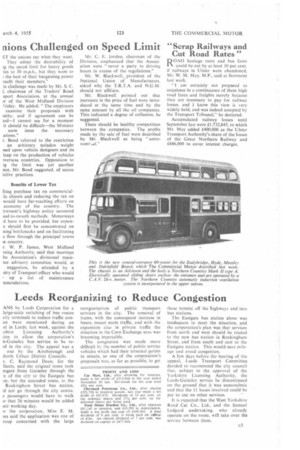[lions Challenged on Speed Limit
Page 41

If you've noticed an error in this article please click here to report it so we can fix it.
ET the unions say what they want. They admit the desirability of ig the speed limit for heavy goods :les to 30 m.p.h., but they want to the best of their bargaining power mat their members."
'is challenge was made by Mr. S. C. I, chairman of the Traders' Road sport Association, at the annual m• of the West Midland Division '2riday. He added: The employers examine their proposals with tathy, and if agreement can be ied—I cannot see for a moment it should be difficult—the Minister soon issue the necessary ations."
r. Bond referred to the restriction an arbitrary unladen weight tsed upon vehicle designers and its icap on the production of vehicles werseas countries. Opposition to ig the limit was yet another nee, Mr. Bond suggested, of union ictive practices.
Benefits of Lower Tax
fting purchase tax on commercial:1e chassis and reducing the tax on would have far-reaching effects on economy of the country. The ..rnment's highway policy savoured ind-to-mouth methods. Motorways d have to be provided, but expenC should first be concentrated on nini bottlenecks and on facilitating c flow through the principal towns ie country.
r. W. P. James, West Midland tsing Authority, said that meetings he Association's divisional mainace advisory committee would, at suggestion, be attended by a stry of Transport officer who would up a list of maintenance -nmendations.
Mr. C. E. Jordan, chairman of the Division, emphasized that the Association were " never a party to driving hours in excess of the regulations."
Mr. W. Blackwell, president of the National Union of Manufacturers. asked why the T.R.T.A. and N.U.M. should not affiliate.
Mr. Blackwell pointed out that increases in the price of fuel were introduced at the same time and by the same amount by all the oil companies. This indicated a degree of collusion, he suggested.
There should be healthy competition between the companies. The profits made by the sale of fuel were described by Mr. Blackwell as being " astronom;:41."












































































































